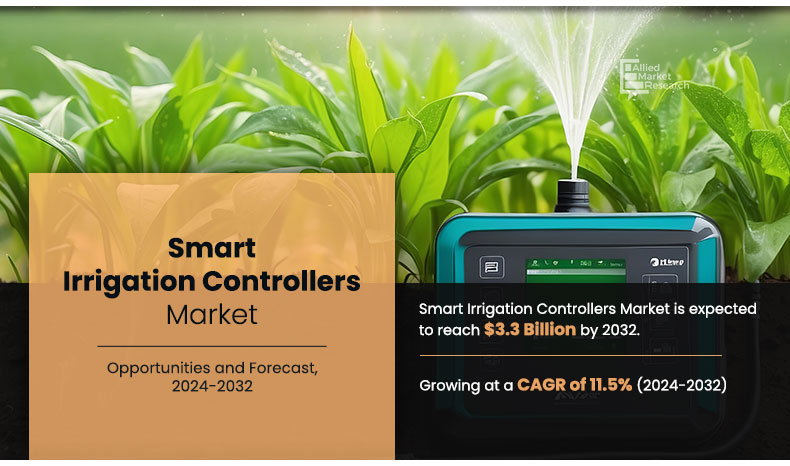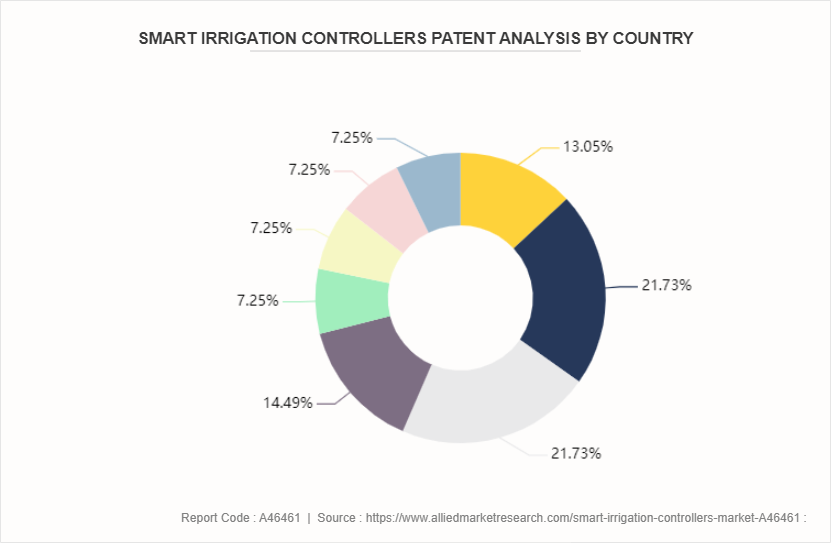Smart Irrigation Controllers Market Research, 2032
The global smart irrigation controllers market was valued at $1.3 billion in 2023, and is projected to reach $3.3 billion by 2032, growing at a CAGR of 11.5% from 2024 to 2032.

Market Introduction and Definition
Smart irrigation controllers are advanced systems that automatically adjust watering schedules and amounts based on real-time weather data, soil moisture levels, and plant needs. Unlike traditional timers, these controllers use sensors and internet connectivity to optimize irrigation, ensuring landscapes receive the precise amount of water required. This not only conserves water but also promotes healthier plant growth by preventing over- or under-watering. Non-agriculture smart Irrigation controllers is a process to supplement precipitation by artificial means, with the goal of maintaining soil moisture during the growing seasons of turf and ornamental plants. It also provides an artificial supply of water to parks, private and public gardens, and sporting grounds such as ovals and bowling greens.
The smart irrigation controllers features include remote access via smartphones, integration with home automation systems, and the ability to create customized watering zones. By reducing water waste and improving efficiency, smart irrigation controllers are an essential tool for sustainable water management in residential, commercial, and agricultural settings.
Key Takeaways
The smart irrigation controllers market forecast study covers 20 countries. The research includes a segment analysis of each country in terms of value for the projected period.
More than 1, 500 product literatures, industry releases, annual reports, and other such documents of major smart irrigation controllers industry participants along with authentic industry journals, trade associations' releases, and government websites have been reviewed for generating high-value industry insights.
The study integrated high-quality data, professional opinions and analysis, and critical independent perspectives. The research approach is intended to provide a balanced view of global markets and to assist stakeholders in making educated decisions to achieve their most ambitious growth objectives.
Key market dynamics
The smart irrigation controllers market is growing rapidly due to concerns about water scarcity, advancements in technology, and the increasing use of IoT in agriculture. Further, enhanced efficiency, water conservation benefits, and supportive government incentives and regulations for sustainable water use are boosting the smart irrigation controllers market growth .However, growth is restrained by high initial costs, limited user awareness, and challenges in integrating smart irrigation systems with existing irrigation setups. Technical difficulties and the need for reliable internet access in rural areas also restrict the market growth.
Despite these challenges, the market offers substantial future opportunities. Innovations in AI and ML are expected to provide more precise water management solutions. Expanding urbanization and smart city initiatives create new markets for residential and commercial applications. In addition, rise in investments in precision agriculture and the development of affordable solutions are anticipated to further drive market expansion.
Patent Analysis of Global Smart Irrigation Controllers Market
The smart irrigation market is segmented according to the patents filed by U.S., China, India, PCT, Australia, European Patent Office, Malaysia and South Africa has the largest number of patent filings, owing to suitable research infrastructure. Approvals from these patent holders countries are followed by high adoption of smart irrigation and initiatives associated with enhancing irrigation system at regional and global level. Therefore, these countries have the maximum number of patent filings.

Market Segmentation
The global smart irrigation controllers market is segmented into type, and end user. On the basis of type, the market is divided into weather-based controllers, and soil-based controllers. As per end user, the market is segregated into agriculture, and non- agriculture. Region wise, the market is analyzed across North America, Europe, Asia-Pacific, Latin America and Middle East & Africa.
Market Segment Outlook
Based on type, the weather-based controllers segment held the highest market share in 2023, accounting for nearly two-thirds of the smart irrigation controllers market size as weather-based controllers rely on real-time weather data to adjust watering schedules, offering a more dynamic and responsive approach to irrigation management.
Based on end user, the agriculture segment held the highest market share in 2023, accounting for nearly two-thirds of the smart irrigation controllers market share due to the critical importance of water efficiency and crop yield optimization in farming.
Regional/Country Market Outlook
The North America smart irrigation controllers market is growing due to the water conservation initiatives, technological advancements, and a strong emphasis on sustainable practices. For example, companies like Rachio and Rain Bird have introduced smart irrigation systems that utilize weather data and IoT technology to optimize watering schedules, reducing water waste while maintaining healthy landscapes. Top players in the smart irrigation controllers market outlook have focused on strategies such as product innovation, partnerships with technology firms, and expanding distribution networks to gain a competitive edge. Rachio, for instance, has partnered with Amazon Alexa and Google Assistant to offer voice-controlled irrigation systems, enhancing user convenience and accessibility. Rain Bird has emphasized robust research and development efforts to introduce advanced features like soil moisture sensors and predictive watering algorithms, catering to the diverse needs of non-agriculture, and agricultural customers. These strategies have contributed to the continued dominance of these companies in the North America smart irrigation controller's market.
The European Irrigation Association (EIA) is set to hold an online forum on June 21, 2024, focusing on water optimization challenges and opportunities for producers. This includes discussions on textile water storage and underground irrigation systems.
In August 2023, Water News Europe reported on the use of state-of-the-art technology in smart irrigation systems that are helping to address critical challenges such as global food security and water resource protection. These systems are increasingly compatible with mobile devices, allowing remote interaction and optimization based on local weather conditions.
In August 2021, in Europe, a prototype irrigation controller with multiple ground sensors linked to a cloud-based platform has been built, which can automatically calculate and verify the exact water, fertilizer, and light needs for each area of a garden.
In April 2021, China plans to add 18.3 million hectares of high-standard farmland by 2025, which will include efficient water-saving irrigation facilities. This initiative is part of a broader effort to enhance agricultural productivity and sustainability
Competitive Landscape
The major players operating in the smart irrigation controllers market overview include Rachio, Rain Bird Corporation, Hunter Industries, Netafim, Toro Company, Orbit Irrigation Products, Weathermatic, Hydropoint Data Systems, Baseline Systems and Galcon.
Other players in the smart irrigation controllers market include Skydrop, Blossom, B-hyve (by Orbit) , GreenIQ and others.
Recent Key Strategies and Developments
In March 2024, Rachio launched Rachio 3 Smart Sprinkler Controller, which is designed to be user-friendly and compatible with most residential yard sizes. It can be controlled via a smartphone app, allowing users to manage their watering schedule from anywhere.
In January 2024, Rain Bird introduced Root Booster Series, the NP Shrub Adapter, and a 2HP Booster Pump. These products are part of Rain Bird’s commitment to providing top-quality irrigation solutions.
Industry Trends
In May 2024, MIT’s GEAR Lab developed new drip irrigation technology solutions, including a low-pressure drip emitter and a low-cost precision irrigation controller, which aim to optimize water and energy use in farming.
In September 2023, the UK government and regulatory bodies introduced initiatives and incentives to promote the use of water-efficient technologies, including smart irrigation systems.
In August 2021, a prototype for smart urban irrigation developed by the University of Hohenheim showed promising results in Frankfurt. The system aims to use the least amount of water in the most efficient way possible. It was tested with 18 soil measuring sensors on young trees, indicating potential for massive water savings.
The ELEKTRORAIN project, funded by the EU, developed a smart system that allows farmers to remotely adjust sprinklers and irrigation systems via a smartphone app. This innovation aims to make agricultural irrigation more efficient, reducing water wastage and saving fuel used for pumps and sprinklers
Key Benefits For Stakeholders
- This report provides a quantitative analysis of the market segments, current trends, estimations, and dynamics of the smart irrigation controllers market analysis from 2024 to 2032 to identify the prevailing smart irrigation controllers market opportunities.
- The market research is offered along with information related to key drivers, restraints, and opportunities.
- Porter's five forces analysis highlights the potency of buyers and suppliers to enable stakeholders make profit-oriented business decisions and strengthen their supplier-buyer network.
- In-depth analysis of the smart irrigation controllers market segmentation assists to determine the prevailing market opportunities.
- Major countries in each region are mapped according to their revenue contribution to the global market.
- Market player positioning facilitates benchmarking and provides a clear understanding of the present position of the market players.
- The report includes the analysis of the regional as well as global smart irrigation controllers market trends, key players, market segments, application areas, and market growth strategies.
Smart Irrigation Controllers Market Report Highlights
| Aspects | Details |
| Market Size By 2032 | USD 3.3 Billion |
| Growth Rate | CAGR of 11.5% |
| Forecast period | 2024 - 2032 |
| Report Pages | 220 |
| By Type |
|
| By End User |
|
| By Region |
|
| Key Market Players | Netafim, Weathermatic, LLC, HydroPoint Data Systems, The Toro Company, Hunter Industries, Inc., Baseline Systems, Rachio, Galcon, Orbit Irrigation Products, Rain Bird Corporation |
The global smart irrigation controllers market was valued at $1.3 billion in 2023 and is projected to reach $3.3 billion by 2032, growing at a compound annual growth rate (CAGR) of 11.5% from 2024 to 2032.
The market growth is driven by concerns about water scarcity, technological advancements, and the increasing use of the Internet of Things in agriculture. Additionally, enhanced efficiency, water conservation benefits, and supportive government incentives & regulations for sustainable water use are boosting the market.
growing concerns over water scarcity and the need for sustainable practices and integration of IoT and AI technologies are the upcoming trends of Smart Irrigation Controllers Market in the globe
Agriculture has the leading application of Smart Irrigation Controllers Market.
North America is the largest regional market for Smart Irrigation Controllers.
Rachio, Rain Bird Corporation, Hunter Industries, Netafim, Toro Company, Orbit Irrigation Products, Weathermatic, Hydropoint Data Systems, Baseline Systems and Galcon are the top companies to hold the market share in Smart Irrigation Controllers.
Loading Table Of Content...


